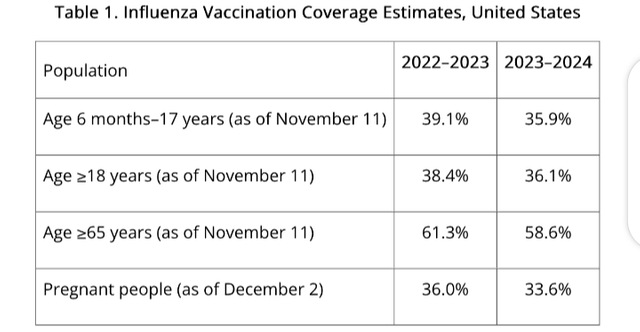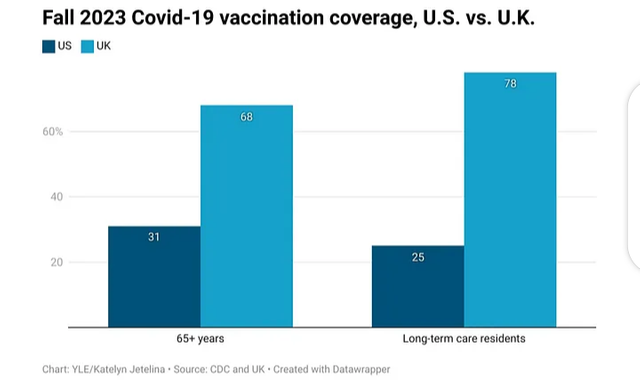
The season, my friends. The time of year when we embark on the joyous tasks of gift shopping, cherishing our loved ones, and reveling in the festivities of the holidays. However, for those of us residing in the Northern Hemisphere, there is an additional challenge we must face during this period: the respiratory virus season.
This season brings forth a troubling concoction of microbes, including Covid, flu, and RSV. Regrettably, this year's respiratory virus season appears to be particularly harsh. Recent data from the CDC reveals a staggering increase in hospitalizations across all age groups in the United States: a 200% surge for influenza, a 51% rise for Covid, and a 60% uptick for RSV in the past four weeks. Traditionally, viruses tend to circulate predominantly during the winter months. While Covid is still a relatively new virus and has not yet settled into a predictable seasonal pattern, we are witnessing a surge in many regions of the United States.
The colder weather, travel, and indoor gatherings all contribute to the rapid spread of these diseases. (Fortunately, our counterparts in the Southern Hemisphere are currently enjoying their summer, and they will be spared from the respiratory virus season for a few more months.) Although respiratory viruses may seem like mere annoyances, their impact stretches far beyond that perception. For young children and the elderly, these viruses often result in hospitalizations and tragically claim the lives of tens of thousands of people in the United States each year.
Even for young individuals who were previously healthy, an infection can lead to missed workdays and a miserable few days or more. Can vaccinations completely eradicate these problems? No, they cannot. However, they are undeniably our most effective form of protection. Unfortunately, we are lagging far behind in this crucial aspect. Flu vaccination rates have slightly declined compared to last year and the situation is even worse for Covid vaccination:

over 60% of individuals over the age of 60 have not received this year's vaccine. Furthermore, only 16% of individuals over 60 have chosen to receive the RSV vaccine, which is a novel and highly effective method of preventing hospitalizations. Unlike the flu and Covid vaccines, the RSV vaccine currently requires only one shot, providing several years of protection. (As it is a recent development, we will need to wait a few years to determine if booster shots are necessary. While we do not possess complete knowledge regarding its long-term effectiveness, we can affirm that it is safe and it works. Only time will reveal its duration of protection.)
The Covid and influenza viruses undergo rapid changes over time, and our immunity acquired from previous vaccinations and infections diminishes. This is why it is crucial to receive updated vaccinations. New variants of Covid, such as HV.1 and JN.1, are spreading and may possess a greater ability to evade our immune defenses. Nevertheless, the upcoming fall vaccine is designed to target the XBB 1.5 variant and is expected to offer protection against these other variants as well.
By increasing the number of individuals getting vaccinated, we can diminish the severity of illness and reduce deaths during this season. This is especially important for older adults and individuals with underlying medical conditions. It is imperative that we ensure residents and staff in nursing homes are vaccinated, as the vaccination rates in these facilities are unacceptably low. Additionally, we must address disparities based on race, zip code and income and strive to protect those who are most vulnerable, just as other countries have done.
These issues were highlighted by Katelyn Jetelina at Your Local Epidemiologist. Unfortunately, the United States is significantly behind other countries in safeguarding those who are most at risk. Seniors in the United Kingdom are twice as likely, and nursing home residents are three times as likely, to be up to date with their Covid vaccinations. This means that unless vaccination rates improve, many American seniors will tragically lose their lives unnecessarily in the upcoming months.

Each of us has a role to play in protecting ourselves and minimizing the risk of transmitting a potentially dangerous infection to those around us. Make sure you receive your updated vaccinations! It is not too late. Everyone aged 6 months and older should receive this season's flu and Covid vaccinations. Adults aged 60 years and older are eligible for the RSV vaccination. You can find vaccines at your local pharmacy or by visiting vaccines.gov, where they are available at no cost. If you have any concerns, consult with your doctor. If you will be in crowded indoor spaces or traveling through airports, consider wearing a mask.
There is clear evidence that masks can reduce the risk of spreading Covid and becoming infected. If you fall ill, do your best to distance yourself from others. While we are all looking forward to holiday celebrations, no one wants to unintentionally transmit an infection to their loved ones. Discuss testing and treatment options with your doctor. Instead of passively entering the respiratory virus season and being abruptly confronted with a surge of infections that dampen our holiday spirit, let's take action to protect ourselves and others by getting vaccinated.